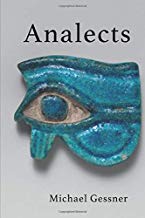
Spiders
I’m wasting time
just looking at a spider—
it helps me to look at them.
This one, poised in its web, up
side down, below the lamp, black
legs tapered to a point
self-contained as a cocked hammer
seems ready to wait through eternity
for its prey. Sometimes, though
one waits so long, it dies
hanging in its own web.
Idly glancing over
I see through them
realize they’re gone, legs folded
little umbrellas closed
for the evening— a bit hideous
how silently they
evaporate, in the corner
of the bathroom window
where they took all
their chances.
The window sill
is the Altar of What Has Fallen,
littered with specs of spider crap, a wing
floating a rainbow, a bent thread, a leg
a nano knot in it
that’s a marvelous knee
discarded in the serene dust.
I read that no matter where you are
you’re within twelve feet of a spider
even on Mt. Everest
where the Himalayan Jumping Spider lives.
Eight eyes orbit its head
giving it 360 degree vision. Supposedly nothing
lives up there but this spider. It eats insects
that have been blown off course
drifted too high, like transmigrated souls
who rose on stolen wings in previous lives.
These incomplete beings are destined
to become food for the spider
that survives in a layer of warmth
hovering on rocks of the world’s highest mountain
thin as our atmosphere relative to the globe.
No bird soars too high, Blake reminds us
if the bird soars with his own wings.
But just look into the face
of one of those little jumping ones around here
wolf spiders, I think they’re called,
with four eyes, the beautiful orange
black and white face
takes you back a bit—
beware. It sees you
with such fearless and unhesitating intelligence
you realize it
could take you
like in high school
when you might be caught absent-mindedly
staring at some kid, not even seeing him
a tough kid, and suddenly he says
“What’re you lookin’ at.”
That snaps you out of it
you look away
slightly bewildered, even embarrassed, wondering
What were you looking at?
The jolt of fear helps. Absent-minded looking
isn’t seeing. Still, there is something to it:
a man at the railing of a ship, lost in unseeing
facing the sea
feeling the wind
feeling his face
knows something of the limbic zones
we travel.
The seen proves the unseen
as Whitman says. And the unseen
the seen, in its turn.
What are we doing
when we waste time?
Spiders don’t waste time.
They construct their webs
and wait.
If I died in this chair
they’d use my body
for tie-down points.
It’s good to waste time like this.
It’s humanizing.
And being human is a refuge
for a while.
The more we relinquish our humanity
the more spiders will die
hanging in their own webs, waiting
for insects that no longer exist.


